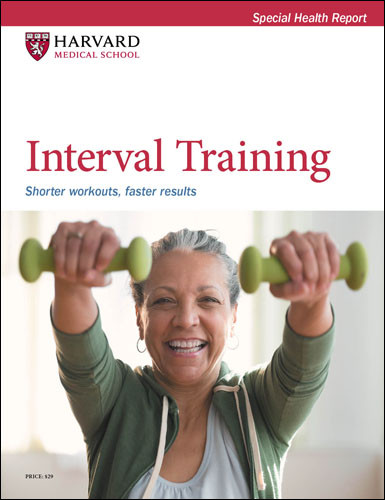Cognitive benefits from high-intensity interval training may last for years
In the journals
- Reviewed by Howard E. LeWine, MD, Chief Medical Editor, Harvard Health Publishing; Editorial Advisory Board Member, Harvard Health Publishing

Engaging in regular exercise is linked to multiple health benefits, including maintaining cognitive abilities and perhaps reducing the risk of dementia.
Results from a study published online July 8, 2024, by Aging and Disease suggest high-intensity interval training (HIIT) may be better for brain health than other, less vigorous routines. HIIT workouts consist of repeated cycles of short bursts of high-intensity exercise followed by brief "recovery" periods of lower-intensity movement.
In the study, researchers enrolled 151 healthy adults, ages 65 to 86, in a six-month exercise program. Participants underwent a battery of tests to assess function in the hippocampus — the brain area associated with learning and memory. Everyone was randomly assigned to do one of three half-hour exercise routines: balance and stretching, brisk walking on a treadmill, or four HIIT cycles on a treadmill. (Each HIIT cycle consisted of four minutes at 85% to 95% of a person's maximum heart rate, followed by three minutes of recovery.)
Everyone did approximately 30-minute workouts three days a week for about six months, for a total of 72 sessions. On repeat testing, only the HIIT exercisers showed positive changes in hippocampus functioning compared to their initial evaluation. At a follow-up evaluation five years later, the researchers found that again only the people in the HIIT group retained their improved cognitive function, even if they were no longer doing HIIT.
Image: © VioletaStoimenova/Getty Images
About the Author

Matthew Solan, Former Executive Editor, Harvard Men's Health Watch
About the Reviewer

Howard E. LeWine, MD, Chief Medical Editor, Harvard Health Publishing; Editorial Advisory Board Member, Harvard Health Publishing
Disclaimer:
As a service to our readers, Harvard Health Publishing provides access to our library of archived content. Please note the date of last review or update on all articles.
No content on this site, regardless of date, should ever be used as a substitute for direct medical advice from your doctor or other qualified clinician.
















